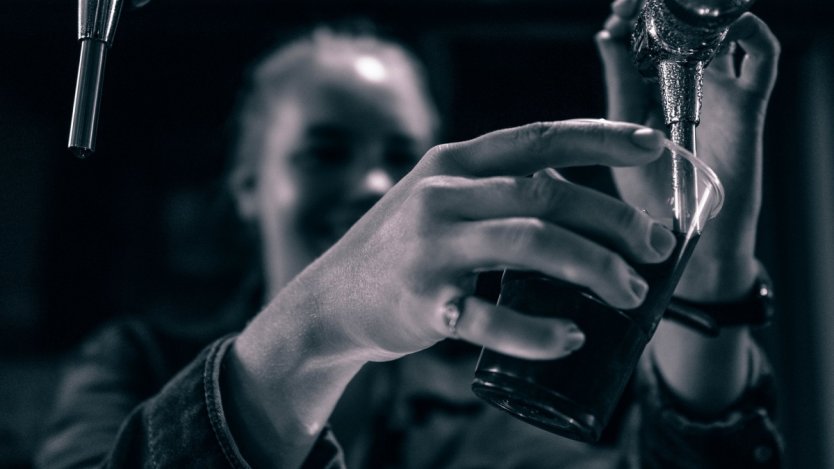In December, the hospitality business south of the border was rocked by two similar and enmeshed stories of sexual harassment complaints against celebrity chef, Mario Batali, and renowned restaurateur, Ken Friedman. The Canadian restaurant business hasn't fared any better with regards to high-profile sexual harassment cases. One of the first public cases was pastry chef Kate Burnham’s accusations, made in 2015, against three chefs at Weslodge restaurant in Toronto. In late May of this year, Chef Matthew Carmichael of Riviera restaurant in Ottawa faced repeated accusations of sexual harassment. That sting is particularly acute because his star is rising. In October, the restaurant was ranked 7th on enRoute magazines prestigious list of Canada’s Best New Restaurants 2017. While celebrity chefs, legal and PR teams, and business partners scramble to manage the crisis and find the fastest route to redemption, the outcome for women remains veiled.
Most who step forward can't afford the resources their alleged harassers have access to as leaders of large hospitality groups. Often, the behaviour is not isolated, so their strength lies in numbers. But even then, recent cases like Jian Ghomeshi raise questions about a justice system of which the scales seem tipped toward men. In the aftermath of public humiliation, a chef may appear remorseful, but their legal team may simply pick up where they left off.
One of the thorny issues for celebrity chefs is the inextricable link between personal accountability and corporate liability. When lawyers and PR firms pen apologies in the face of crisis, the primary objective is to protect business interests. The apologies are written by rote and sorely lack sincerity.
Read between the lines of Batali’s first apology for ominous signs. “Disappointed” is one of the words he uses to describe the feelings of his victims, friends, family, business partners, and fans. In light of what he is accused of, it’s a grossly inadequate choice of adjectives. But if the objective is to diminish the emotional impact of the accusations and imply the women are exaggerating, it works. He claims responsibility for “much of the behaviour,” following it up by declaring “full responsibility.” How is that possible when he’s left room for dispute? Twice he states a desire to “regain” his celebrity chef status as if his current problems are temporary. That idea was reinforced when he sent out an apology with a recipe attached in his weekly newsletter. It’s as if the accusations don’t amount to much, are a legal inconvenience, and after a few bad days, he’s back in business.
In an interview and statement to CTV news, chef Matthew Carmichael’s apology includes positioning himself as a “champion” for sexual harassment. It’s impossible not to think of his victims and wonder how they feel about his new status as poster-boy for the cause. He claims to have consulted his fiancé in the matter, casting her as the all-too-familiar sympathetic woman standing by her man. He’s quick to point out the accusations, “to his knowledge,” only involved inappropriate comments that he thought were complimentary under the influence of drugs and alcohol.
Fresh out of rehab for substance abuse, his sobriety can be measured in weeks and is tenuous at best. Substance abuse is not an excuse for bad behaviour it’s a symptom of deeper problems. Stay tuned, because the rush to get in front of the story and paint a sympathetic self-portrait in advance of the third claim raises concern about the content of that case.
Batali’s apology includes a few sloppy and vague comments suggesting all will be well after he “works” stuff out for the “next period of time.” But the familiar swagger returns when he says, “I won’t make that mistake again.” Anyone who’s dealt with an abuser knows that's a giant red flag. Sexual harassment complaints against Batali span several decades. That kind of deeply entrenched, troubling behaviour does not come to a halt overnight. Without time and quality help, the odds are high that he will offend again. There is no guarantee this is Batali’s bottom.
Although the accusations are levelled in a very public manner, the end is written behind closed doors and is protected by confidentiality agreements. We can only guess what the experience of going public was like for Kate Burnham. We’ll never know how Weslodge behaved during legal proceedings. Did the brutality she experienced in the kitchen carry on? Her insights and experience, which stand to benefit others, are stifled.
Google Burnham’s name and almost every item on the first few pages are stories about her sexual harassment complaint. She continues to live with that event more than two years later. In the digital sphere, it defines her.
Do the same for Weslodge, and the first story of Burnham’s complaint appears halfway down the second page. Celebrity chefs and hospitality groups hire reputation management companies whose job it is to bury unfavourable press. Is it a coincidence that a very tepid 2012 Globe and Mail two-star review of the restaurant gets enough traffic to give it first-page ranking? It’s clear that reputation management for women should factor into a legal agreement.
Any man who attacks a former or current employee's professional reputation should be treated with wariness. The inequity in the power dynamic is considerable. Ken Friedman, the owner of New York hot spots, The Spotted Pig and The Breslin, used his celebrity status and industry connections to stifle his victims, threatening to smear their reputations and destroy their careers. Silence and character assassination have a parasitic relationship to sexual harassment.
Even after the public outing, powerful men mine their contacts for sympathetic ears. They use well-worn media access to state their case repeatedly and shape public perception. Often, their victims get one shot in the public sphere. The number of victims who choose anonymity is a measure of the fear of retribution.
If values trickle down from the top, what's the culture like in the restaurants left in the wake? How much of a leader's attitude and nature remains? Are they really safe places when close business partners like April Bloomfield, and Joe Bastianich claim limited knowledge of the goings-on in their backyard?
The heaviest burden to protest still falls to women. Only a couple of male celebrity chefs have publicly stepped forward to help. But for anyone with skin in the business, this is the restaurant industry's current public relations campaign. These are not isolated incidents; this is who we are. Sexual harassment is the earthquake David Chang wasn’t counting on.
At this juncture, due process seems too lenient. One solution is to make the outcome a whole lot more painful. Women need to play hardball and impress on their legal counsel a disinterest in a womanly return. They need to look at any settlement on offer and ask if a man would accept the terms if the tables were turned.













